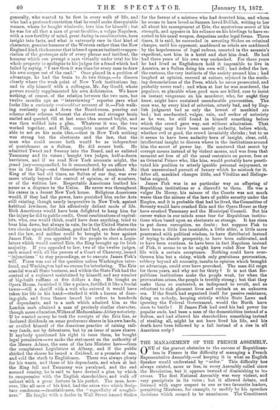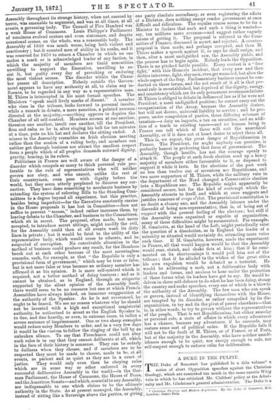THE MANAGEMENT OF THE FRENCH ASSEMBLY.
ONE of the gravest obstacles to the success of Republican- ism in France is the difficulty of managing a French Representative Assembly,—of keeping it in what an English Speaker would understand by "order." This difficulty has always existed, more or less, in every Assembly called since the Revolution, but it appears instead of diminishing to in- crease. The first National Assembly was very violent, and very precipitate in its votes ; but it allowed debate, and listened with eager respect to one or two favourite leaders, permitting Mirabeau, for example, to modify by his speeches decisions which seemed to be unanimous. The Constituent
Assembly throughout its strange history, when not coerced by terror, was amenable to argument, and was at all times, at all events, a governing body. The Council of Five Hundred was a weak House of Commons. Louis Philippe's Parliament of nominees evolved orators and even statesmen, and despite occasional scenes, on the whole, was a reasonable body. The Assembly of 1848 was much worse, being both violent and reactionary ; but it counted men of ability in its ranks, and it was reserved for 1870 to return a Chamber in which no one makes a mark or is acknowledged leader of any faction, in which the majority of members are timid nonentities unwilling to support the Executive, unwilling to re- sist it, but guilty every day of provoking or enduring the most violent scenes. The disorder within the Cham-
ber passes all description. Nobody outside the Govern- ment appears to have any authority at all, to claim any in- fluence, to be regarded in any way as a representative man. M. Thiers is interrupted in his most formal speeches. The Ministers "speak amid lively marks of dissent." A member who rises in the tribune, looks forward to personal insults, while a remark in debate, a mere assertion, a pointed sarcasm directed at the majority,—anything appears to deprive the Chamber of all self-control. Members scream at one another, threaten one another, insult one another, till the President, firm and calm as he is, after ringing his bell for ten minutes at a time, puts on his hat and declares the sitting ended. A seance in the Assembly resembles an Irish election meeting rather than the session of a ruling body, and members can neither get through business nor attract the smallest respect from a people which of all peoples demands outward dignity, gravity, bearing, in its rulers.
Politicians in France are well aware of the danger of a disorder which compels so many to think personal rule pre- ferable to the rule of representatives who will neither govern nor obey, and who cannot, unlike the rest of their countrymen, even pose with dignity before the world, but they seem utterly perplexed to discover any cor- rective. They have done something to accelerate business by extending the system of referring Bills to the Standing Com- mittees to a degree beyond all experience, but this practice, besides being imperfect—for the Executive constantly carries in the House proposals it has lost in Committee—does not suffice to prevent "scenes," indeed rather increases them, by leaving debate to the Chamber, and business to the Committees, which sit in secret. The proposal, often made, but never accepted, to introduce secret sittings, might modify the evil, for the Assembly could then at all events wash its dirty linen in private ; but it would be fatal to the utility of the representative body, which would cease to educate, and be suspected of corruption. No conceivable alteration in the method of business could produce any result, for the Members break out at each other because of the most meaningless remarks, such, for example, as that "the Republic is only a provisional form of government," which may be true or false, but is not more false or true because an ordinary member has affirmed it as his opinion. It is more self-control which is required, not a better method of doing business ; and as it cannot be obtained, as in England, through an etiquette supported by the silent opinion of the Assembly itself, there would seem to be no resource but one at which French Assemblies have always kicked, an immense exaggeration of the authority of the Speaker. As he is not reverenced, he ought to be feared. We see no reason whatever why he should not be invested with a high and exceptional magisterial authority, be authorized to arrest as the English Speaker is, to fine, and fine heavily, or even, in extreme cases, to inflict a severe sentence of imprisonment. One or two sharp examples would reduce noisy Members to order, and in a very few days it would be the custom to follow the ringing of the bell by an unbroken silence. To say that Frenchmen could not obey such rules is to say that they cannot deliberate at all, which in the face of their history is nonsense. They can be orderly to dullness when they choose, and if members are to be respected they must be made to choose, made to be, at all events, as patient and as quiet as they are in a court of
justice. They would only even then be obeying rules which are in some way or other enforced in every successful deliberative Assembly in the world—in the Ger- man Parliament, the House of Commons, the House of Peers, and the American Senate—and which, essential to any Assembly, are indispensable to one which claims to be the ultimate authority in the State. As at present managed, the Assembly, instead of sitting like a Sovereign above the parties, or giving one party absolute ascendancy, or even registering the edicts of a Dictator, does nothing except render government at once
difficult and ridiculous. The regular coarse seems to be for a Minister to declare that such and such a thing is wanted— say, ten millions more revenue—and suggest rather vaguely means of getting it. The proposal is referred to the Com- mittee of Finance, discussed in secret, and rejected. A counter- proposal is then made, and perhaps accepted, and then M. Thiers makes a speech against it, or says he shall resign, and then, after a most undignified row, the Assembly yields, and the process has to begin again. Nobody leads the Opposition. There is no pitched battle possible. Every contest is a "free fight," with this Homeric incident, that every now and them deities intervene, fight, slay men, even get wounded, but alter the whole aspect of the fray. Parliamentary business cannot be con- ducted on these terms, and the net result of it all is that per- sonal rule is re-established, but deprived of the dignity, energy, and consistency which are its only permanent recommendations. M. Thiers is obliged to debate in defiance of law as if he were not President, a most undignified position; he cannot carry out the reorganization of the Army, because the Assembly desires, but will not decree, universal liability to service ; and he pro- poses, under compulsion of parties, three differing schemes of taxation—a duty on imports, a tax on securities, and an addi- tion of a tenth to existing taxes—and no human being in France can tell which of these will suit the anarchical Assembly, or if it does not at heart desire to reject them all.
This is, we repeat, the great danger of Republicanism in France. The President, for aught anybody can perceive, is perfectly honest in preferring that form of government. The Assembly, though hostile, has not the courage openly to attack it. The people at each fresh election send up a heavy majority of members either favourable to it, or disposed to support it while it lasts. In the elections of the past week no less than twelve out of seventeen are Republicans, and two more supporters of M. Thiers, while the military vote in the department of the Nord changed a Conservative election into a Republican one. The Republic might apparently be considered secure, but for the kind of contempt which the Assembly attracts to itself, and which at once suggests and justifies rumours of coups d'e'tat. The provisional constitution is no doubt a clumsy one, and the Assembly labours under the. discredit of being non-representative, that is, of being out of rapport with the present feeling of the electors ; but still if the Assembly were organized or capable of organization, many of these difficulties might be surmounted. For example, M. Gambetta, at the head of the Left, might periodically raise the question of a dissolution, as in England the leader of a minority so situated would certainly do, attracting more votes each time. If M. Gambetta, however, made the experiment in France, all that would happen would be that the Assembly would roar, shriek, and shake fists at him ; that if he com- mented on its shortcomings it would pull him out of the tribune ; that if he alluded to the wishes of the great cities his own expulsion would be debated as a terrorist. He- would be addressing a mob, not a deliberative body with leaders and forms, and anxious to hear under the protection of those forms what its leaders have got to say. He would be driven in sheer self-defence to do what he has been doing, stump the country and make speeches, every one of which is a blow to the authority of the Assembly. The few men who can speak or govern, instead of identifying themselves with the House, are tempted by its disorder, or rather compelled by its dis- organization, to try and fix the pivot of power elsewhere—that is, in other words, to try to govern without the representative& of the people, That is not Republicanism, but either anarchy or personal rule, a state of affairs in which every adventurer has a chance, because any adventurer, if he succeeds, may restore some sort of political order. If the Republic fails it will not be the fault of M. Thiers, or of France, or of Paris, but of the majority in the Assembly, who have neither unself- ishness enough to be quiet, nor energy enough to rule, nor self-respect enough to enforce calm for deliberation.



































 Previous page
Previous page